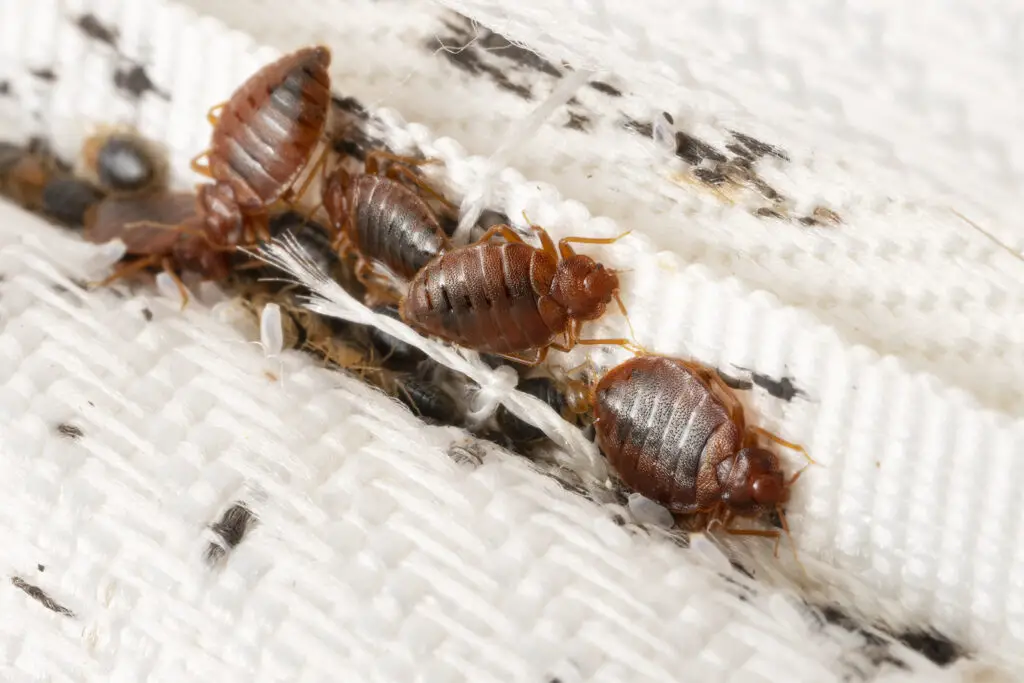As you grapple with the pesky issue of bed bugs, you might be rummaging through home remedies and wondering if baby powder could be an effective solution. The common belief is that its fine particles might interfere with the bed bugs’ ability to survive, potentially leading to their demise. Baby powder’s main ingredients—talc or cornstarch—are thought by some to absorb the oils and fats from the bugs’ exoskeletons and could, arguably, act as a desiccant to dehydrate and kill these unwelcome guests.
However, despite these theories, evidence suggests that baby powder isn’t a strong weapon in the battle against bed bugs. Professional pest control advice, backed by scientific reasoning, typically counters the argument for baby powder as a reliable insecticide. It appears that while the powder may cause some minor annoyances to the bugs, it doesn’t necessarily lead to an effective kill-off. You’re more likely to need professional methods to fully eradicate bed bugs from your home.
Efficacy of Baby Powder in Bed Bug Control
When you’re battling bed bugs, you might have heard that baby powder is a handy home remedy. However, the effectiveness of baby powder against these pests is not well-supported by research.
- Composition: Baby powder can be made from talc or cornstarch. Neither of these substances are toxic to bed bugs or have properties that would effectively eliminate them.
- Absorption Theory: It’s believed that talcum in baby powder could absorb the waxy layer of a bed bug’s exoskeleton, leading to dehydration. This idea, however, is largely anecdotal and not scientifically proven.
Experts, such as those at Terminix, typically recommend more reliable and tested methods to control bed bug infestations. If you’re considering using baby powder, it’s crucial to understand that it is not a recognized pesticide and its use could at best result in minimal impact on these tenacious pests.
To get rid of bed bugs effectively, you’re much better off using treatments that are backed by entomological science rather than relying on baby powder. If you’ve encountered this pest problem, seeking professional advice or using proven pest control solutions will offer you a more reliable path to a bug-free home.
Application Methods of Baby Powder
When attempting to use baby powder in the context of bed bug management, there are a couple of methods traditionally mentioned. Keep in mind, these applications are more folklore than scientifically backed solutions.
-
Sprinkling Method:
- Simply sprinkle a thin layer of baby powder directly on your mattress, bed frame, or carpet. The theory is that it makes these surfaces inhospitable to bed bugs.
-
Trap Coating:
- Step 1: Take a container, like a bowl.
- Step 2: Coat the inside with a slippery layer of baby powder.
- Step 3: Place the container under the legs of your bed.
- The intent here is to make it too slippery for bed bugs to crawl out, trapping them inside.
In terms of effectiveness, though, it’s important to note that these methods lack conclusive evidence in their ability to kill or manage bed bug infestations. Bed bugs have an exoskeleton that is supposedly susceptible to drying out upon contact with substances like baby powder, but this is more a deterrent than a killer.
These methods are traditionally seen as a do-it-yourself approach and should not be relied upon to solve a bed bug problem. For enduring results and thorough eradication, professional pest control services are recommended. For more detail on the limitations of baby powder against bed bugs, you can refer to the analysis on Terminix’s discussion and insights from Pest Ideas.
Alternative Bed Bug Remediation Strategies
If baby powder isn’t the solution you’re looking for, don’t worry. There are several other strategies that you can try to alleviate your bed bug dilemma. Considering heat treatment, for instance, can be very effective. Bed bugs can’t survive in high temperatures, so steaming your mattress could be a gamechanger for ridding your bed of these pests.
Here are some additional tactics:
- Vacuum: Regularly vacuuming your mattress, furniture, and carpets can help you physically remove bed bugs and their eggs from your living area.
- Encasements: Invest in mattress and pillow encasements to trap bed bugs and prevent them from getting to you.
- Diatomaceous Earth: This powdery substance can effectively kill bed bugs by damaging their exoskeleton.
Do’s and Don’ts:
| Do | Don’t |
|---|---|
| Use a high-heat steam cleaner for your mattress. | Use baby powder as a reliable method. |
| Seal cracks and crevices to eliminate bed bug hiding places. | Apply excessive amounts of pesticides without professional guidance. |
Remember, while these methods can reduce the bed bug population in your home, consulting with a professional may be the most effective way to ensure that you’re taking the right steps towards a bed bug-free space. If you’re curious about the effectiveness of baby powder itself, there’s a guide that goes in-depth on that subject, which can offer more insight.
Safety and Precautions with Home Remedies
When you opt for home remedies to tackle bed bugs, it’s crucial to prioritize safety. Remember, not all natural solutions are safe for you, your family, or your pets. Here are some key safety tips:
-
Check if it’s pet-friendly: Some substances used in home remedies can be toxic to pets. For example, essential oils often used in DIY pest control can be harmful to cats and dogs.
-
Avoid food-grade materials around children: Just because something is safe to eat doesn’t mean it’s safe for children to inhale or play with. Keep DIY pest treatments out of reach of children.
-
Proper ventilation: When using any substance, ensure the area is well-ventilated. This minimizes the risk of inhalation of any fine powders or strong smells.
-
Test on a small area first: Before applying any substance to your furniture, do a patch test to avoid damage.
-
Personal Protective Equipment (PPE): Use gloves and masks when applying powders or liquids, especially if you have sensitive skin or allergies.
| Substance | Pet Safety | Child Safety | Ventilation Required | PPE Suggested |
|---|---|---|---|---|
| Diatomaceous earth | Generally safe | Keep out of reach | Yes | Yes |
| Essential oils | Often toxic | Keep out of reach | Yes | No |
| Baking soda | Generally safe | Keep out of reach | No | Yes |
| Vinegar | Generally safe | Keep out of reach | Yes | No |
Remember, home remedies are often a trial-and-error process. Be prepared to adjust your approach and always err on the side of caution. Keep in mind that consulting a professional might be a safer and more effective option for pest control.
Frequently Asked Questions
When you’re dealing with bed bugs, it’s natural to seek quick and effective solutions. This section aims to answer some of the most common questions about eradicating bed bugs and the use of various substances in dealing with them.
What can instantly eliminate bed bugs?
Though it sounds appealing, there isn’t a substance that can eliminate bed bugs instantly. Professional heat treatments are the fastest method, but they require specialized equipment and should be conducted by professionals.
Is diatomaceous earth effective for getting rid of bed bugs?
Diatomaceous earth can be effective for getting rid of bed bugs as it undermines their exoskeleton and causes dehydration. However, it works gradually and is not an instant solution.
What are the most effective traps for bed bugs?
Traps often used include interceptors placed under bed legs, traps leveraging attractants like carbon dioxide, and adhesive traps. These don’t eliminate infestations but can help monitor and reduce bed bug populations.
Can cornstarch be used to treat bed bug infestations?
While cornstarch is sometimes mentioned as a home remedy for bed bugs, it doesn’t have any scientifically proven effect on bed bug infestations.
What kinds of powders are known to exterminate bed bugs?
Powders such as diatomaceous earth and certain chemical insecticides are known to be effective over time. Baking soda is sometimes mentioned, but its efficacy is debatable.
Do bed bugs have an aversion to certain smells or powders?
Bed bugs are repelled by certain smells, like lavender or peppermint, but these are only deterrents and not solutions for eradication. Some powders, like diatomaceous earth, can control bed bugs but complete extermination often requires a multi-faceted approach.
Driven by a passion for those tiny creatures that rule our world, we at Bug Domain strive to be your go-to resource for information on insects.




